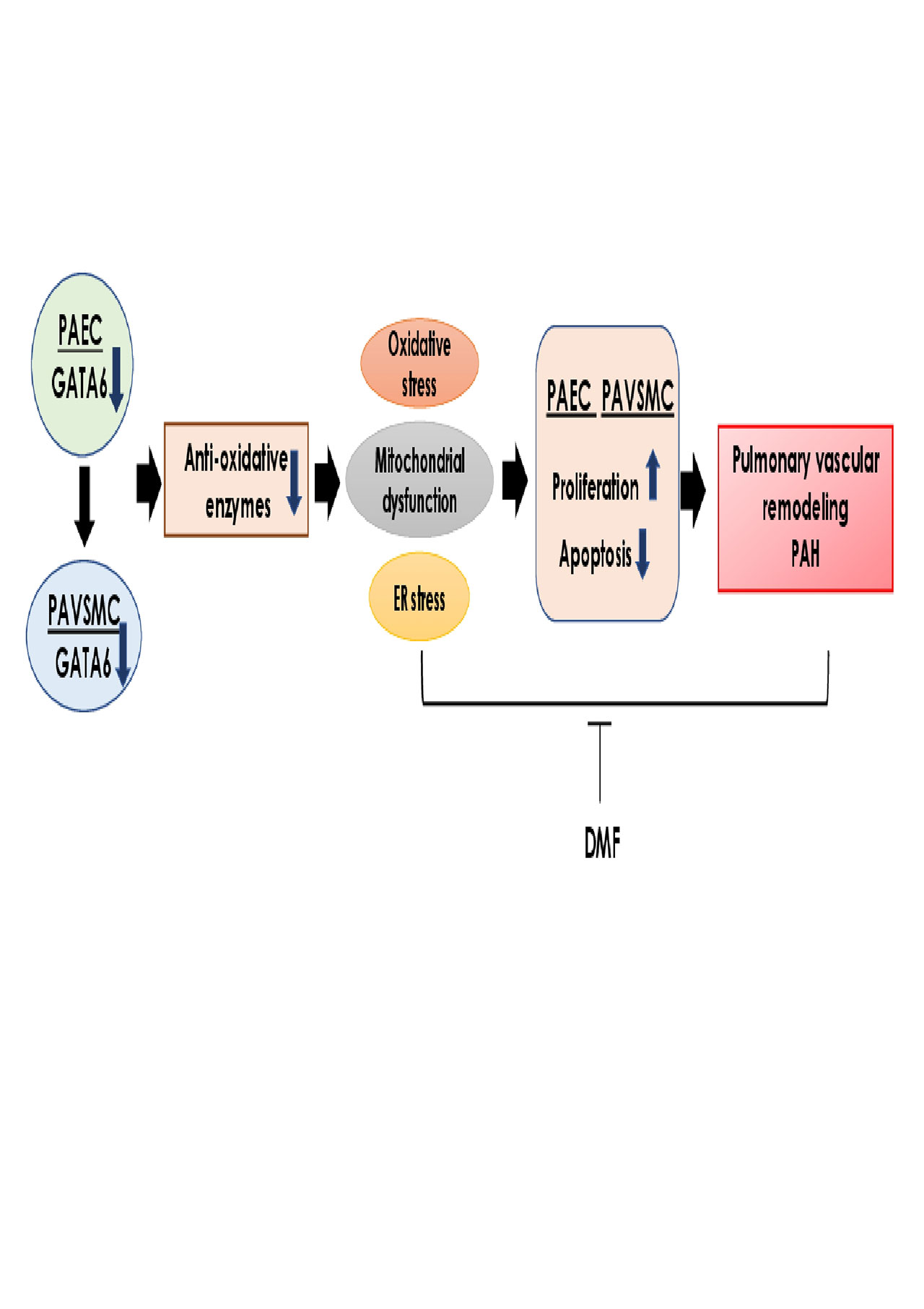Session Information
Date: Tuesday, November 12, 2019
Title: 5T095: Systemic Sclerosis & Related Disorder – Basic Science (2744–2749)
Session Type: ACR Abstract Session
Session Time: 2:30PM-4:00PM
Background/Purpose: Pulmonary arterial hypertension (PAH) is a leading cause of death in patients with limited form of systemic sclerosis (SSc). We have previously reported that GATA6 is downregulated in pulmonary vasculature in SSc-PAH and IPAH patients and that endothelial cell deficiency of GATA6 is sufficient to promote PAH development in mice (Ghatnekar et al, 2013). The goal of this study was to gain further insights into the mechanism of deficient GATA6-induced PAH and to evaluate the therapeutic potential of dimethyl fumarate (DMF) in preclinical models of PAH.
Methods: In vitro experiments used early-passage distal pulmonary artery endothelial cells (PAEC) and smooth muscle cells (PAVSMC) from PAH and non-diseased lung. GATA6 was depleted in control human PAEC and PAVSMC by transfecting with siRNA GATA6 or restored by transduction with human GATA6 expressing adenovirus. Enzymatic activities of superoxide dismutase 2 (SOD2), glutathione peroxidase 1 (GPX1) and catalase was determined using commercially available kits. Cellular and mitochondrial ROS production was examined using CellROX and MitoSOX probes, respectively. In vivo experiments used mice with endothelial-specific Gata6 deficiency (Gata6 CKO). DMF or vehicle control were administered daily for 3 weeks via i.p. injection.
Results: Transcriptome analysis of human PAEC transfected with GATA6 siRNA revealed downregulation of multiple genes involved in the antioxidant stress response, including SOD2, catalase, and GPX family members. ChIP analysis indicated that GATA6 is a direct transcriptional regulator for SOD2 and GPX1. Human PAEC with siRNA-induced GATA6 depletion showed marked increase in both cellular and mitochondrial ROS production in parallel with the upregulation of the ER stress genes. Reduced levels of GATA6 were also present in PAEC and PAVSMC obtained from patients with PAH and were associated with increased cell growth. Adenoviral delivery of GATA6 in human PAH PAEC and PAVSMC reduced their growth and induced PAVSMC apoptosis. Importantly, GATA6 and SOD2 were downregulated in control PAVSMC treated with conditioned media obtained from GATA6 siRNA treated PAEC. Increased oxidative and ER stress were also recapitulated in Gata6 CKO mice. Treatment with DMF normalized pulmonary pressure and partially reversed right heart hypertrophy in Gata6 CKO mice. DMF also normalized expression of antioxidant enzymes, including SOD2 and GPX and reversed the oxidative and ER stress in the lungs of Gata6 CKO mice. DMF also restored eNOS expression levels previously shown to be downregulated in these mice.
Conclusion: Deficiency of GATA6 is a shared pathological feature between PAEC and PAVSMC in human SSc-PAH and experimental PAH. GATA6 acts as a direct positive regulator of SOD2 and other antioxidant enzymes, providing protection from oxidative stress and supporting pulmonary vascular homeostasis. GATA6 controls PAEC-PAVSMC communication and endothelial GATA6 deficiency results in GATA6 loss and consequent proliferation of PAVSMC, exacerbating pulmonary vascular remodeling and PAH. Beneficial effects of DMF on the key pathways contributing to PAH, supports its testing in PAH treatment in patients.
To cite this abstract in AMA style:
Ichihara A, Toyama T, Kudryashova T, Shen Y, Goncharov D, Goncharova E, Trojanowska M. Dimethyl Fumarate Ameliorates the GATA6 Deficiency-Induced Pulmonary Hypertension by Normalizing Oxidative and ER Stress [abstract]. Arthritis Rheumatol. 2019; 71 (suppl 10). https://acrabstracts.org/abstract/dimethyl-fumarate-ameliorates-the-gata6-deficiency-induced-pulmonary-hypertension-by-normalizing-oxidative-and-er-stress/. Accessed .« Back to 2019 ACR/ARP Annual Meeting
ACR Meeting Abstracts - https://acrabstracts.org/abstract/dimethyl-fumarate-ameliorates-the-gata6-deficiency-induced-pulmonary-hypertension-by-normalizing-oxidative-and-er-stress/

